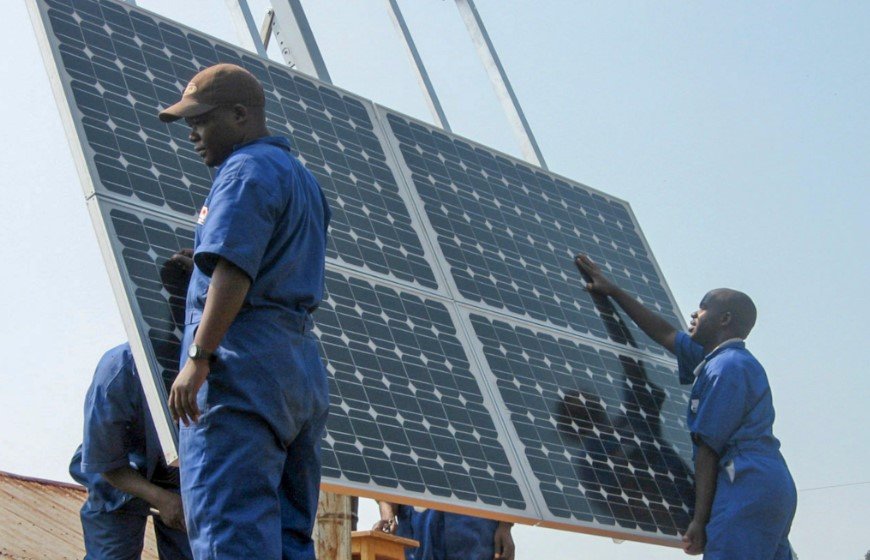Saudi Arabia has signed on to fund the drilling of 78 solar-powered wells across Nigeria, a major water initiative expected to benefit more than 730,000 people in 10 states.
The deal, announced by the King Salman Humanitarian Aid and Relief Centre (KSrelief), signals Riyadh’s growing soft-power footprint in Africa—through clean water, not oil.
A Lifeline for Millions in Water-Stressed Regions
Nigeria’s water crisis has long been a ticking time bomb. In remote parts of northern Nigeria, many people—especially women—walk hours just to fill a jerrycan.
That may soon change for over 700,000 Nigerians.
On June 17, 2025, Saudi Arabia’s KSrelief sealed a cooperation agreement with a Nigerian civil society organization to roll out solar-powered wells across 10 states. The agreement was inked virtually by Eng. Ahmed bin Ali Al-Baiz, KSrelief’s Assistant Supervisor General.
The number is ambitious: 78 medium-depth wells equipped with solar systems, scattered across regions where piped water is either unreliable or non-existent.
And yes, it’s not just for humans. Livestock will benefit too.

Targeting Thirst, Disease, and Infant Mortality
Water is life—literally. In many Nigerian villages, unclean water is a death sentence for children under five.
“This agreement isn’t just about access. It’s about survival,” said a senior KSrelief official who wasn’t authorized to speak on the record.
According to the Saudi Press Agency, the initiative focuses on:
-
Supplying safe drinking water for people and animals
-
Supporting water needs for homes and farms
-
Cutting down the spread of parasitic diseases
-
Improving childhood nutrition via access to clean water
Those aren’t just buzzwords. Diarrheal diseases linked to unsafe water are among the top five killers of children in Nigeria, according to UNICEF.
The Numbers Behind the Pledge
Here’s a quick snapshot of what the Saudi-backed project is trying to accomplish:
| Detail | Figure |
|---|---|
| Total number of solar wells | 78 |
| Number of Nigerian states involved | 10 |
| Estimated beneficiaries | 733,350 people |
| Lead agency | King Salman Humanitarian Aid Centre |
| Date agreement signed | June 17, 2025 |
In a country of over 220 million, this won’t solve the entire water problem. But for the communities covered, it’s a watershed moment.
Where Will the Wells Go?
The full list of participating states hasn’t been disclosed yet. But a senior Nigerian water ministry source said they include:
-
Borno
-
Yobe
-
Sokoto
-
Zamfara
-
Bauchi
-
Niger
-
Katsina
-
Kebbi
-
Nasarawa
-
Adamawa
Most of these regions are located in Nigeria’s arid northern belt—areas hardest hit by drought, insecurity, and poverty.
A resident of Zamfara state, Halima Musa, 43, shared her reaction by phone. “If this borehole comes to our village, I will stop sending my daughters to fetch water,” she said. “They walk two hours daily just to bring water that still makes us sick.”
Why Solar? It’s Simple: Diesel Is a Dealbreaker
In areas without grid electricity, boreholes often run on diesel. But diesel prices have soared in Nigeria, thanks to subsidy removals and forex volatility.
Solar is now the smart choice. Quiet, low-maintenance, and—most importantly—cheaper over the long haul.
“This project would not be feasible with diesel or petrol. Solar is the only sustainable solution,” said Dr. Ijeoma Nwosu, a WASH (Water, Sanitation and Hygiene) consultant in Abuja.
She called the move “a win-win for both health and climate resilience.”
Saudi Arabia’s Growing Humanitarian Footprint in Africa
This isn’t Saudi Arabia’s first rodeo in Nigeria. But it’s among the most tangible.
Through KSrelief, the Kingdom has funded health, food security, and shelter programs across sub-Saharan Africa. But water? That’s a newer priority.
The centre, founded in 2015 under King Salman’s directive, operates in over 90 countries. Its Nigeria arm has picked up speed in recent years—thanks, in part, to Saudi Crown Prince Mohammed bin Salman’s push for regional influence beyond oil exports and security cooperation.
In 2024 alone, KSrelief funded emergency food drops in Niger, mobile hospitals in Chad, and mosquito-net distributions in Kenya.
Community Buy-In May Make or Break the Project
No matter how shiny the solar panels are, boreholes can fail fast if locals don’t own and maintain them.
That’s why, according to the agreement, the implementing NGO will work closely with community leaders and set up user committees to manage the wells. Repairs, cleaning schedules, and fee collections will be locally handled.
“It’s not just about drilling and leaving,” said the head of the Nigerian CSO involved in the deal. “It’s about sustainability.”
She said similar past efforts by international donors failed because “no one thought about who’d change a broken valve five years later.”
Global Donors Watch Closely, Eye Scale-Up
Nigeria is a test case.
If the Saudi model works, other Gulf states—like the UAE and Qatar—might follow suit. Already, there are whispers in humanitarian circles about expanding solar boreholes into South Sudan and Sudan’s Darfur region.
“Saudi Arabia’s move is strategic,” said Dr. Khaled Osman, an international development analyst based in Cairo. “It’s humanitarian, yes. But it’s also geopolitical soft power with long-term dividends.”
He pointed out that the country is eyeing a greater role in Africa’s development space, one long dominated by Western donors and Chinese loans.
